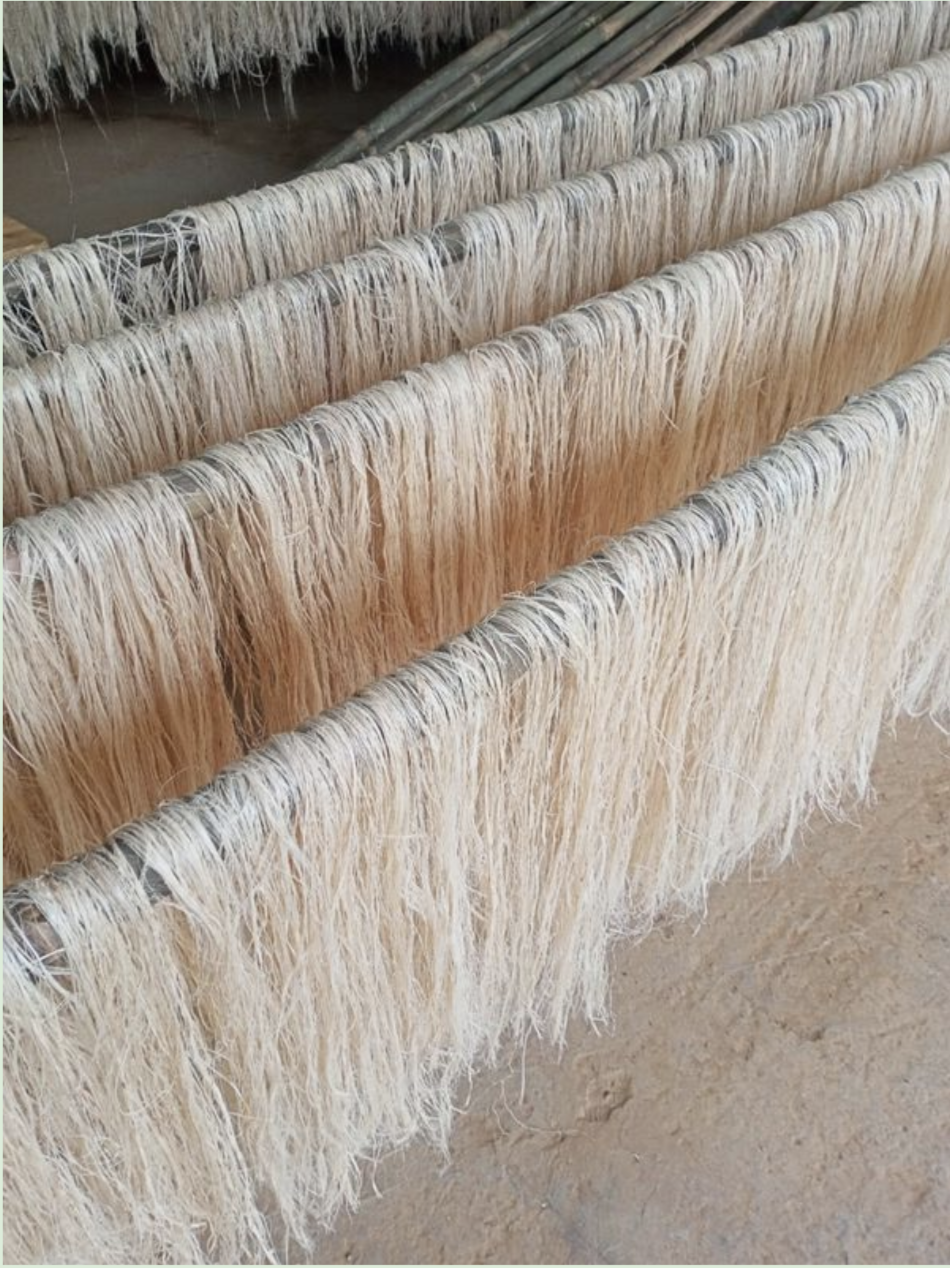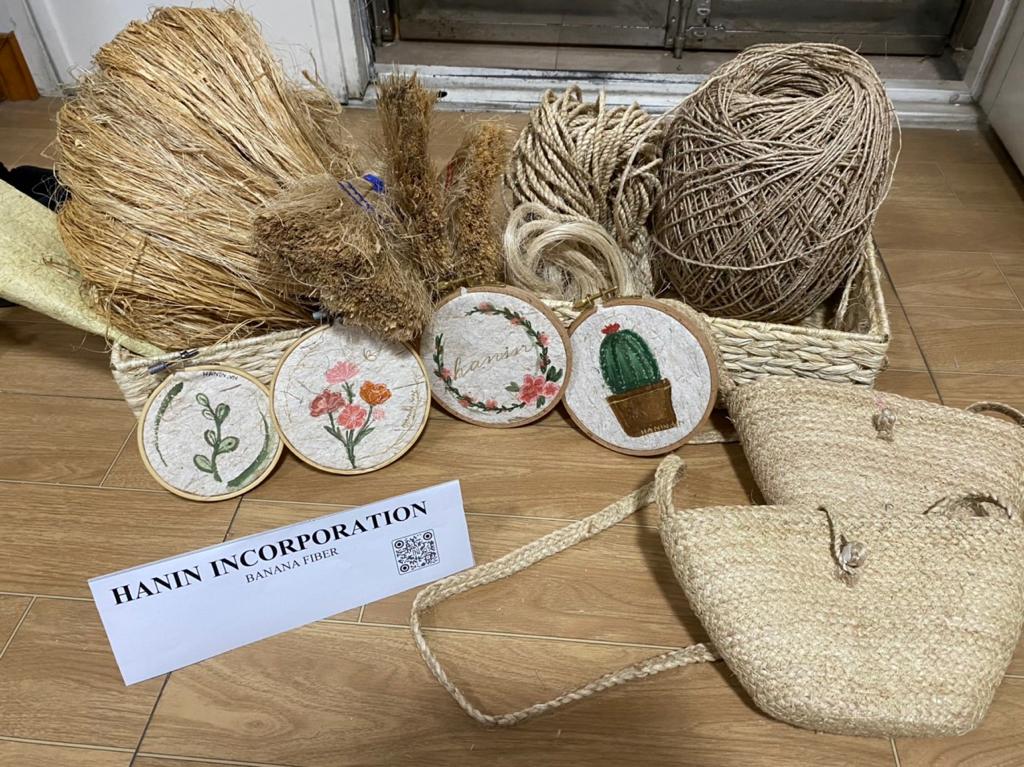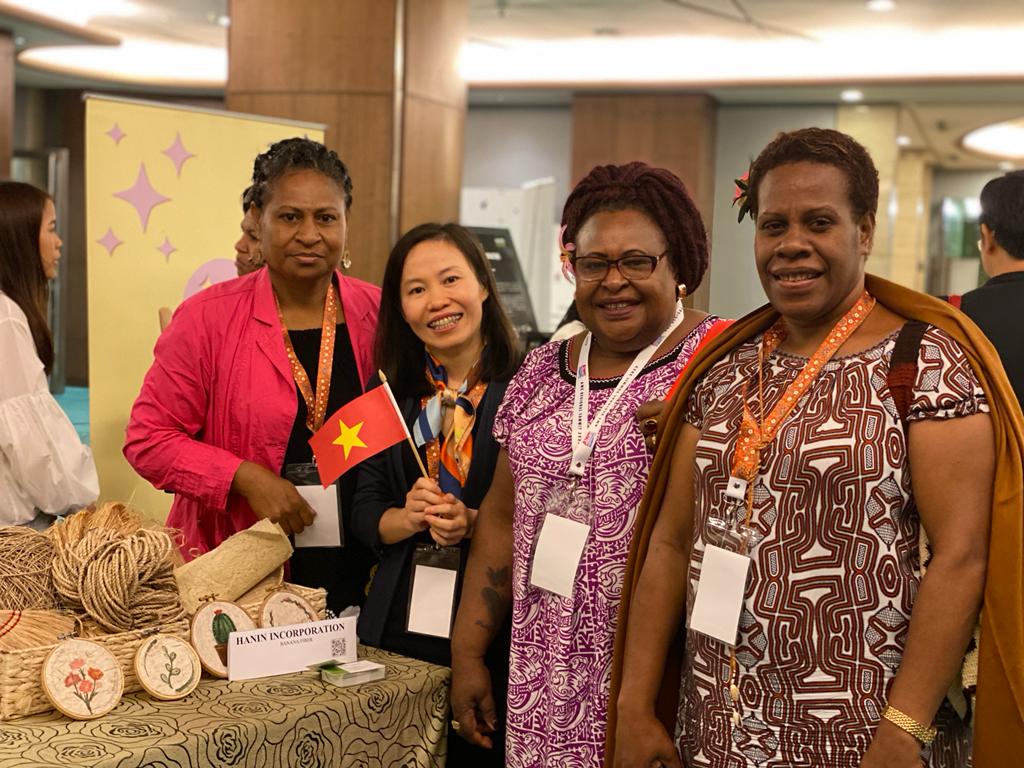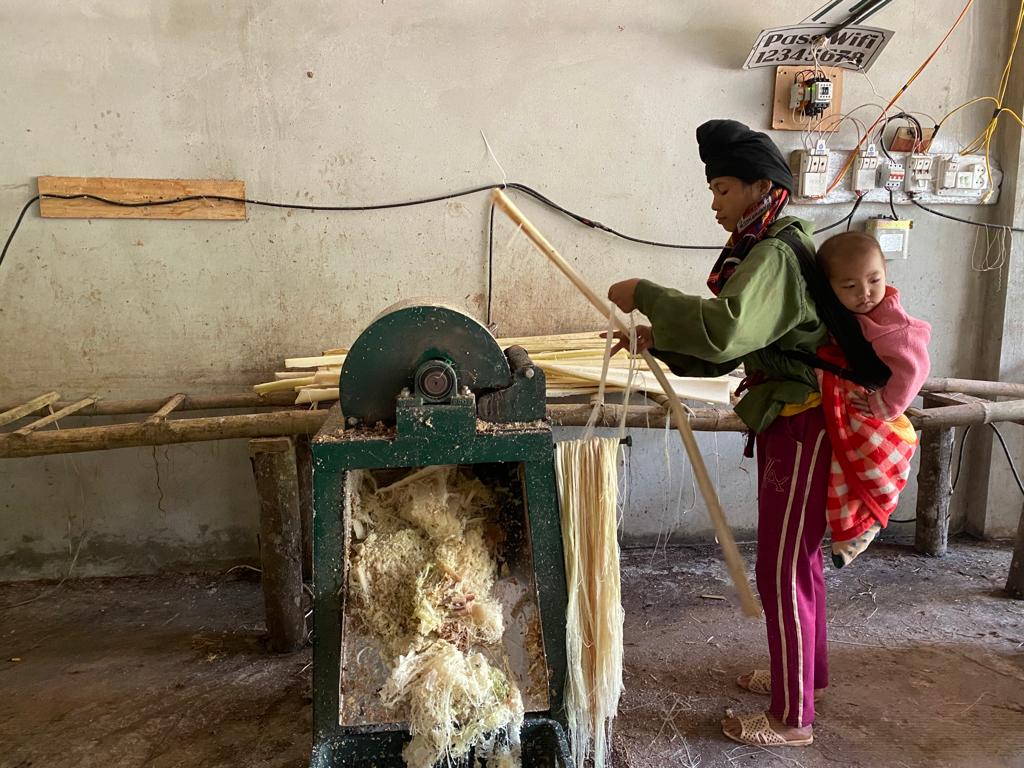Article by Roni Kane, former intern with the U.S. Department of State, currently studying International Studies and Film, TV and Media at the University of Michigan.
img-20230523-wa0003.jpg
 Vietnamese AWE alumna Mai Nguyen Thi Tuyet launched her company to produce products from banana fibers, one of the world’s strongest natural fibers. (Photo courtesy of Mai Nguyen Thi Tuyet)
Vietnamese AWE alumna Mai Nguyen Thi Tuyet launched her company to produce products from banana fibers, one of the world’s strongest natural fibers. (Photo courtesy of Mai Nguyen Thi Tuyet)
[Vietnam, May 2023] Banana trees cover 370,000 acres of land in Vietnam, and with its warm tropical climate that allows the sweet, yellow fruits to flourish year-round, Vietnam has become a major exporter of bananas — both in Asia and across the world. But one woman entrepreneur in Hanoi, the capital city, is less interested in selling bananas than she is in using banana trees as a means for sustainable material for textile production.
Academy for Women Entrepreneurs (AWE) Exchange Alumni Mai Nguyen Thi Tuyet launched her business, Hanin Inc., in 2019 alongside three other co-founders. Mai and her partners purchase banana fibers — water-resistant fibers that come from the stem of the banana tree and are one of the strongest natural fibers in the world — from local Vietnamese banana growers. They then leave the fibers out to dry before processing them into yarn, which can be used to craft anything from purses and baskets to bracelets and lampshades.
Banana fiber has garnered attention as an eco-friendly alternative to synthetic fibers — like polyester, rayon and nylon — for creating textile products in recent years. Banana trees only produce fruit once before they are cut down or left to decay, meaning the leaves and stem of the plants typically become waste on banana farms. Because the fibers Mai uses to craft her products come from the stems, her business model helps reduce this waste.
screen_shot_2023-04-26_at_3.32.01_pm.png
 Thousands of individual banana fibers hang on metal poles to dry before Hanin Inc. can transform them into yarn and other textile products. (Photo courtesy of Mai Nguyen Thi Tuyet)
Thousands of individual banana fibers hang on metal poles to dry before Hanin Inc. can transform them into yarn and other textile products. (Photo courtesy of Mai Nguyen Thi Tuyet)
Mai said the idea for the business came from her 12-year-old daughter. A couple of years ago, Mai said her daughter told her about her dream of becoming a fashion designer. At the time, Mai was 38-years-old and was looking for a passion project that would help her find “Ikigai” — a Japanese concept that means one’s life-purpose, or their “reason for being alive.” Mai said the phrase Ikigai is also used to describe a symbiotic relationship between the human race and the natural world.
“We can also understand ‘Iki’ means ‘people’ and ‘gai’ means nature, motherland,” Mai said.
So when her daughter’s dream inspired her to consider a future career in fashion design, Mai said she was able to turn to the U.S. Department of State’s AWE program to develop a company that would embrace both beauty and sustainability. As a part of the 2023 AWE cohort, Mai said the program encouraged her to think critically about entrepreneurship strategies and business tactics for the first time.
photo_from_roni_kane2.jpg
 A variety of the custom products that Mai can create with banana fibers — from decorative pieces to purses — were displayed at the AWE regional summit. (Photo courtesy of Mai Nguyen Thi Tuyet)
A variety of the custom products that Mai can create with banana fibers — from decorative pieces to purses — were displayed at the AWE regional summit. (Photo courtesy of Mai Nguyen Thi Tuyet)
The AWE program uses the DreamBuilder online learning platform — which was designed by Arizona State University’s Thunderbird School of Global Management and the Freeport-McMoRan Foundation using a cutting-edge U.S. business curriculum — to help program participants complete a set of modules on everything from product innovation to marketing. Mai said working through the modules alongside the rest of her cohort instilled a sense of community in her.
“DreamBuilder opened the door for me with my start-up,” Mai said. “I accessed and learned from many useful modules and developed my network with other women who are creating an impact in Vietnam.”
Mai said she felt especially connected with the AWE community on an international level when she attended the first regional AWE Summit, which took place in Malaysia in March. She said getting to meet so many women who are passionate about entrepreneurship was inspiring. There was a shared sense of accomplishment — since all of the attendees had completed the AWE program — but each woman had her own experiences and perspectives on entrepreneurship, which Mai explained made the summit so enriching.
photo_from_roni_kane1.jpg
 AWE Exchange Alumni Mai Nguyen Thi Tuyet (second from left) connected with other AWE alumni from the Pacific Islands at the AWE Summit in Malaysia in March for International Women’s Day. (Photo courtesy of Mai Nguyen Thi Tuyet)
AWE Exchange Alumni Mai Nguyen Thi Tuyet (second from left) connected with other AWE alumni from the Pacific Islands at the AWE Summit in Malaysia in March for International Women’s Day. (Photo courtesy of Mai Nguyen Thi Tuyet)
“It is fascinating, the strong connection between us when we all grew up in [different] countries,” Mai said. “And then we all graduated from AWE and ended up in the same place. I felt very inspired and motivated to keep moving forward with my business.”
After returning to Vietnam, Mai said she and the other three co-founders of her company are working to set up meetings with companies in China and the Philippines that use banana fiber for textile products. She said the summit highlighted the value of international cooperation for her and she plans to strengthen the ties between her company and others with similar missions around the world going forward.
In a way, her journey in entrepreneurship reminds her of the banana trees she has come to cherish, Mai said. Like a banana tree, Mai said she worked to seize the moment when she saw an opportunity to “bloom,” which has led her to establish Hanin Inc. — the fruits of her labors and her lifelong legacy.
photo_from_roni_kane.jpg
 Mai hopes to learn more about how banana fibers are processed and used in other countries in order to refine the Hanin Inc.’s process. (Photo courtesy of Mai Nguyen Thi Tuyet)
Mai hopes to learn more about how banana fibers are processed and used in other countries in order to refine the Hanin Inc.’s process. (Photo courtesy of Mai Nguyen Thi Tuyet)
“Nature is like a human — there is a cycle of life from seeding to maturation and then the cycle repeats again,” Mai said. “But a banana tree is different, it will flower and bear fruit only once in its lifetime.”
The Academy for Women Entrepreneurs operates under the Bureau of Educational and Cultural Affairs at the U.S. Department of State, and helps women like Mai build their business acumen and have the knowledge, networks and access to launch and grow their own businesses. Thanks to a partnership with Arizona State University and the Freeport-McMoRan Foundation, AWE currently offers programs in nearly 100 countries and has empowered roughly 25,000 women worldwide. Since its launch in Vietnam in 2022, the program has helped more than 80 Vietnamese women entrepreneurs redefine their life’s purpose and turn their business dreams into reality.



